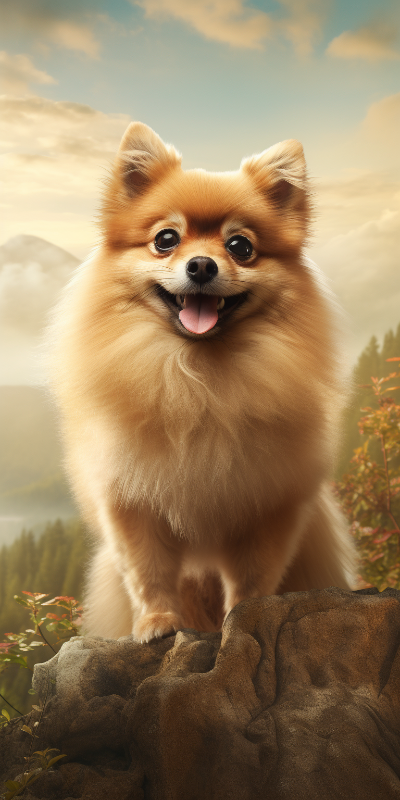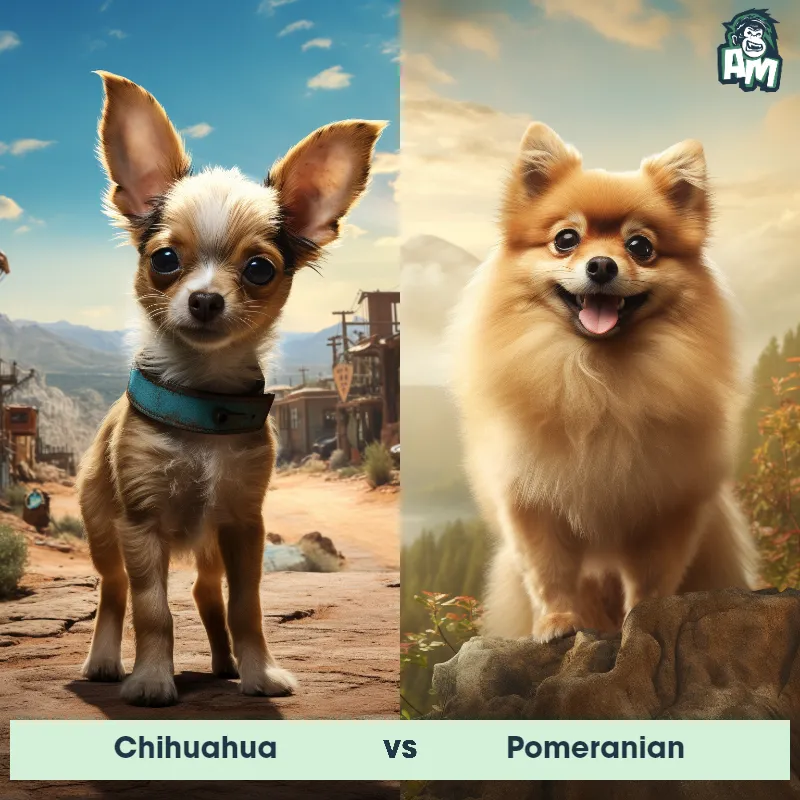The Pomeranian
The Pomeranian is a small breed of dog that is known for its fluffy double coat and compact size. They have a distinctive fox-like face with bright eyes and pointed ears. Pomeranians are highly intelligent, alert, and curious, which makes them excellent companions and family pets. They have a lively and playful nature, often showing confidence and a fearless attitude despite their small size. Pomeranians come in a variety of colors and patterns, and their luxurious coat requires regular grooming to keep it healthy and prevent matting.

| Pomeranian | |
|---|---|
| Size | 7-12 inches (18-30 cm) |
| Weight | 3-7 pounds (1.4-3.2 kg) |
| Speed | 7.4 mph (11.9 km/h) |
| Key Strength | Agility and speed |
| Biggest Weakness | Small size and lack of physical strength |
| Scientific Name | Canis lupus familiaris |
| Family | Canidae |
| Habitat | Domestic |
| Geography | Worldwide |
| Diet | Omnivorous (Primarily commercial dog food) |
| Lifespan | 12 years - 16 years |

The Pomeranian
The Pomeranian is a small breed of dog that is known for its fluffy double coat and compact size. They have a distinctive fox-like face with bright eyes and pointed ears. Pomeranians are highly intelligent, alert, and curious, which makes them excellent companions and family pets. They have a lively and playful nature, often showing confidence and a fearless attitude despite their small size. Pomeranians come in a variety of colors and patterns, and their luxurious coat requires regular grooming to keep it healthy and prevent matting.
Fun Fact: Pomeranians are descendants of large sled dogs from the Arctic region and were bred down in size to create the small companion dogs we know today.
| Pomeranian | |
|---|---|
| Size | 7-12 inches (18-30 cm) |
| Weight | 3-7 pounds (1.4-3.2 kg) |
| Speed | 7.4 mph (11.9 km/h) |
| Key Strength | Agility and speed |
| Biggest Weakness | Small size and lack of physical strength |
| Scientific Name | Canis lupus familiaris |
| Family | Canidae |
| Habitat | Domestic |
| Geography | Worldwide |
| Diet | Omnivorous (Primarily commercial dog food) |
| Lifespan | 12 years - 16 years |
Pomeranian Matchups
We use AI to simulate matchups between the Pomeranian and other animals. Our simulation considers size, strength, and natural predatory behaviors to determine the most likely outcome.

Can't find the Matchup you want?
Create Your Own MatchupPomeranian: Diet, Predators, Aggression, and Defensive Behaviors
What do Pomeranians eat?**
Pomeranians should be fed a high-quality dog food that is appropriate for their size and age. It is recommended to provide them with a balanced diet that includes a mix of proteins, fats, carbohydrates, vitamins, and minerals. Treats can also be given in moderation, but it's important to avoid overfeeding to prevent obesity.
Do Pomeranians have any predators?**
Due to their small size, Pomeranians are vulnerable to attacks from larger animals such as coyotes, wolves, and birds of prey. It is important to always supervise them when outdoors, especially in areas known to have potential predators. Keeping them on a leash or in a secure, enclosed space can help protect them from harm.
Are Pomeranians aggressive?**
Pomeranians are known to be lively, playful, and affectionate companions, but they can also exhibit aggressiveness towards other dogs or strangers if not properly socialized. Early training and socialization are essential to prevent any aggressive behavior in Pomeranians. Proper socialization can help them be friendly and well-behaved around other dogs and people.
Do Pomeranians tend to fight?**
Pomeranians are not typically known for being aggressive or prone to fights. However, like any dog breed, they may show signs of aggression if they feel threatened or scared. It is important to always supervise interactions with other dogs and seek professional help if any behavioral issues arise.
How do Pomeranians defend themselves?**
Pomeranians are small dogs with a big personality, and they may attempt to defend themselves by barking loudly, growling, or even nipping if they feel threatened. Their size and agility can also help them avoid potentially dangerous situations by running away or seeking refuge in a safe place.
What is a Pomeranian's biggest weakness in a fight?**
One of the biggest weaknesses of Pomeranians in a fight is their small size and fragility. Due to their petite stature, they are more susceptible to injuries if they were to engage in a physical altercation with a larger or more aggressive animal. It is crucial to always prioritize their safety and avoid putting them in situations where they could be harmed.
Fun Fact: Despite their small stature, Pomeranians have a surprisingly loud bark and are not afraid to use it, making them excellent watchdogs.
Fun Fact: Pomeranians tend to have a strong bond with their owners and can become overly protective, often considering themselves as "big dogs" even though they are pint-sized, which can lead to them taking on unfamiliar and larger animals without hesitation.











